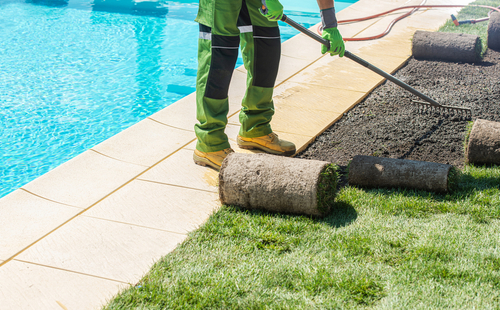
Transform Your Small Garden: Basic Landscaping Essentials
April 17, 2023
Landscaping Around a Pool (A Complete Guide)
June 21, 2023What Should I Do If I Found Snails in My Garden? (Useful Guide)

What Should I Do If I Found Snails in My Garden
Discovering snails in your garden can be a frustrating experience for many gardeners. While snails can serve as an essential part of the ecosystem, they can also cause significant damage to plants. This article will provide a detailed guide on managing snails in your garden, including prevention, control methods, and ways to promote a healthy ecosystem.
Understanding the Snail’s Role in Your Garden
Before we dive into management strategies, it’s essential to understand the role snails play in your garden and why they might be attracted to your plants in the first place.
Snails: Friend or Foe?
Snails are gastropods and are part of the larger mollusk family. They play a vital role in the ecosystem by:
- Breaking down organic matter
- Serving as a food source for other animals
- Contributing to nutrient cycling
However, snails can also cause damage to plants by feeding on their leaves, stems, and fruits. This can lead to reduced crop yields and unsightly damage to ornamental plants.
Why Are Snails Attracted to My Garden?
Snails are attracted to gardens with:
- Abundant food sources, such as tender leaves, fruits, and vegetables
- Moist, damp conditions
- Plenty of hiding spots, like debris, rocks, or dense foliage
Prevention and Control Methods for Snails in Your Garden
The best way to manage snails in your garden is through prevention and control methods.
Preventing Snail Infestations
- Choose snail-resistant plants: Select plants that are less attractive to snails, such as those with tough or textured leaves or those with strong scents.
- Remove hiding spots: Clear away debris, rocks, and dense foliage that can provide shelter for snails.
- Promote biodiversity: Encourage natural predators, like birds and predatory insects, by providing a variety of plant species and habitats in your garden.

Controlling Snails in Your Garden
- Hand-picking: Regularly inspect your plants and remove snails by hand. Dispose of them in a bucket of soapy water or relocate them to a safe distance away from your garden.
- Traps: Create simple snail traps using overturned flowerpots, grapefruit halves, or boards placed on the ground. Check traps daily and dispose of snails accordingly.
- Natural repellents: Spread crushed eggshells, diatomaceous earth, or coffee grounds around your plants to create a barrier that snails find challenging to cross.
- Biological control: Introduce natural predators, like decollate snails or nematodes, to help control snail populations.
- Chemical control: Use snail bait or molluscicides containing iron phosphate or metaldehyde, following the manufacturer’s instructions carefully. Remember that chemical controls should be a last resort, as they can harm non-target organisms and disrupt the ecosystem.
Supporting a Healthy Garden Ecosystem
While managing snail populations is essential, promoting a healthy garden ecosystem that can help keep pests in check is also crucial.
Encourage Natural Predators
Attract natural predators of snails to your garden by providing suitable habitats and food sources. Some of these predators include:
- Birds
- Ground beetles
- Centipedes
- Predatory snails, like decollate snails
Practice Organic Gardening Techniques
Organic gardening techniques can help support a healthy ecosystem and reduce the likelihood of snail infestations. Some organic gardening practices include:
- Crop rotation: Rotating your crops can help prevent snail populations’ buildup and reduce plant disease spread.
- Companion planting: Planting certain plants together can help repel snails and other pests. For example, planting garlic, onions, or marigolds near vulnerable plants can deter snails from feeding on them.
- Mulching: Applying organic mulch, such as straw or bark, can help maintain soil moisture, suppress weeds, and provide a habitat for beneficial organisms like ground beetles.
- Soil health: Maintaining healthy soil through composting and proper fertilization can help support strong plant growth, making them more resistant to pests like snails.
Monitoring and Adapting Your Snail Management Strategies
It’s essential to regularly monitor your garden for snails and adjust your management strategies as needed. Keep track of which methods work best for your specific garden conditions, and continue researching and implementing new strategies to stay ahead of snail infestations.
Regular Garden Inspections
- Inspect your plants frequently for signs of snail damage or the presence of snails themselves.
- Check for snail eggs, which are small, round, and translucent, usually found in clusters under rocks, plant debris, or in soil.
- Monitor the effectiveness of your chosen control methods and adjust them as needed.
Stay Informed
- Stay up-to-date on the latest research and developments in snail management and organic gardening practices.
- Connect with local gardening groups or online forums to exchange tips and strategies with other gardeners dealing with snail infestations.
Key Takeaways for Managing Snails in Your Garden
- Snails can serve as essential members of the ecosystem but can also cause significant damage to plants in your garden.
- Prevent snail infestations by choosing snail-resistant plants, removing hiding spots, and promoting biodiversity.
- Control snail populations using a combination of hand-picking, traps, natural repellents, biological control, and chemical control if necessary.
- Encourage natural predators and practice organic gardening techniques to support a healthy garden ecosystem that can keep snail populations in check.
- Regularly monitor your garden for snails and adapt your management strategies as needed, staying informed about the latest research and developments in snail control.
By following these guidelines, you can effectively manage snails in your garden, protect your plants from damage, and promote a healthy, thriving ecosystem. Looking for professional landscaping services? Contact us today!



